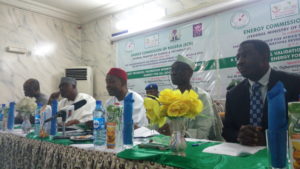For Nigeria to be among the 20 largest economies in the world by 2020, an environmentally sustainable energy supply must be addressed.

Minister of Science and Technology, Dr Ogbonnaya Onu, who made the disclosure last Thursday (14 July, 2016) in Abuja at the opening of the Validation Workshop the Sustainable Energy for All (SE4ALL) Action Agenda, added that the energy supply venture should likewise be secured, equitable and create employment opportunities.
According to him, this can only be achieved through the transformation of the nation’s economy from one based mainly on fossil fuel to a low carbon based around renewable energy and energy efficiency.
“The Nigerian government’s commitment to accelerate the development of renewable energy and energy efficiency in the country is well set out in the National Energy Policy, the Renewable Energy Master Plan (REMP) and the Vision 2020/20,” he said, adding that renewable energy reduces sole dependence on fossil fuels, improves security of energy supply, reduces greenhouse gas (GHG) emissions, creates environmental and social benefits; and delivers green jobs to the economy.
Apart from reviewing the draft SE4ALL Action Agenda, the objective of the two-day gathering was also to: domesticate the SE4ALL Initiative in the country, engage all stakeholders in the development of the SE4ALL Action Plan, and promote dialogue and discourse among policy makers on SE4ALL.
Stakeholders at the meeting included ministries, departments and agencies (MDAs), the media, civil society organisations and international donor and development partners. The forum was organised by the Energy Commission of Nigeria (ECN) in collaboration with The Partnership for Africa’s Development (NEPAD) Nigeria and the United Nations Development Programme (UNDP).
The minister congratulated the ECN and all stakeholders for drafting the Action Plan, while also thanking the UNDP and NEPAD leadership in the country for the support granted to uplift sustainable energy development.
His words: “My ministry will continue to play its role in ensuring that energy development, which is impacted more by science and technology development, is done in a sustainable manner. Renewable energy and energy efficiency best practices will continue to attract my ministry’s attention until it is developed into an economic sub-sector that contributes reasonably to the GDP.”
Tracing the genesis of the SE4ALL, Prof. Eli Jidere Bala, Director-General and CEO of the ECN, said the initiative was formally unveiled in September 2011 by the UN Secretary General with the view of bringing all sectors of the society to support the three interlinked objectives of ensuring universal access to modern energy services; doubling the share of renewable energy in the global energy mix; and doubling the global rate of improvement in energy efficiency, all by 2030. The initiative was launched a year later in Nigeria.
He said: “Consequently, in the discharge of its statutory responsibility for strategic planning and coordination of national energy policies in all its ramifications, ECN was supported by the UNDP to work with other stakeholders, including MDAs, in domesticating the UN initiative in the country.
“To this effect, sensitisation workshops on SE4ALL were held in 2012 and 2013. In 2013 also, a SE4All Rapid Assessment Gap & Analysis for Nigeria was carried out, and stakeholders met to validate the draft. The Rapid Assessment & Gap Analysis provides regional and international stakeholders with information on the current status of the energy access, renewable energy deployment and energy efficiency.”
According to him, the next step in the SE4ALL milestone is the preparation of country-specific Action Agenda across government MDAs to bridge the gaps earlier identified in line with international template.
The UNDP Country Director, Pa Lamin Beyai, emphasised that, once validated, the SE4ALL Action Plan would become a viable instrument to help coordinate strategies and activities to meet the objectives of the SE4ALL Initiative.
“We at the UNDP are indeed very optimistic that, with the quality of stakeholders invited for the workshop, we will have a quality and workable document that will not only help to meet the aspiration of many Nigerians, but also provide a framework for energising the national sensitisation, prioritisation and, most importantly, implementation of the Sustainable Development Goals (SDGs) for the people of Nigeria, and ensure that no one is left behind,” said Beyai, who was represented by Muyiwa Odele.
